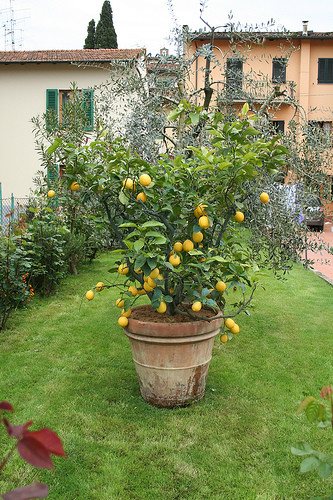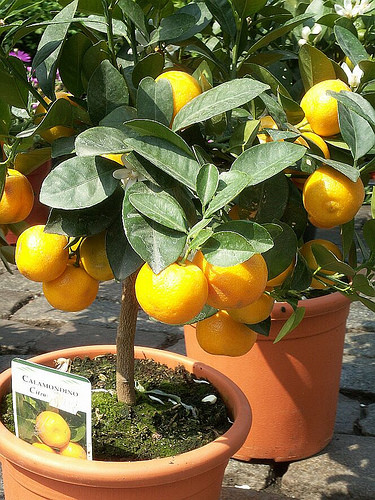Family Rutaceae Grown indoorslemon, orange, mandarin, grapefruit, kimchi. With cold wintering (5–8°C) citrus fruits can bloom and bear fruit in 2–3 years, but they will bear fruit indoors only if they are grafted. Some will enjoy growing a tree from a seed, and it does not matter whether it will bear fruit or not. In any case, in order for your pet to look good, it is important to know the conditions it needs and something about the formation of the crown.
Care Tips
 Citrus plantsTemperature andLightingCitrus fruits, as southern plants, are demanding of light and heat. However, the lemon tree is shade-tolerant, and it can be successfully grown even in a poorly lit room. Electric lighting in the room, of course, successfully promotes the development and fruiting of the lemon tree, of course, in the presence of the necessary temperature conditions, since citrus crops are very thermophilic. Budding, flowering and fruit setting occur best at an average air and soil temperature of + 15-18°C. In winter, citrus fruits are recommended to be kept in a light, cool room (up to 12°C). The lack of a cold wintering can lead to the fact that your plant does not bear fruit. Watering One rule applies to all citruses: as cold a wintering as possible and transfer of plants to the open air for the summer, best of all to the terrace on the southern side of the house, you can also use a balcony, loggia or just a garden. In the summer, water abundantly, 1-2 times a day with warm water, in the winter, water rarely and moderately - 1-2 times a week and also with warm water. However, in winter, you should not allow the earthen lump to dry out, as this leads to curling of the leaves and the fall of not only the leaves, but also the fruits. On the other hand, do not forget that plants die from excess moisture. Starting in October, watering is reduced. It is best to cover central heating radiators with damp towels to humidify the air. Air humidity Citrus fruits should be kept clean, washed frequently, and sprayed with warm water daily during the growth period. Transplantation Young lemon trees should be transplanted by transshipment. Transshipment should be done in a timely manner, otherwise the plant will develop worse due to a lack of nutrients. Transshipment should not be carried out if the plant roots have not yet braided the earthen lump. In this case, it is enough to change the drainage and top layers of soil in the pot. When transshipping, the pot must be washed with boiling water or a solution of potassium permanganate. Fruit-bearing lemon trees are transplanted no more than once every 2-3 years. They are transplanted before they begin to grow. It is not recommended to transplant the plants after growth has finished. It is not recommended to transplant lemon trees with flowers or fruits, as this leads to the loss of both. The soil for young plants should be light, and for large ones, heavier. Usually a mixture of turf soil, greenhouse manure and leaf soil with the addition of coarse sand is taken. Soil
Citrus plantsTemperature andLightingCitrus fruits, as southern plants, are demanding of light and heat. However, the lemon tree is shade-tolerant, and it can be successfully grown even in a poorly lit room. Electric lighting in the room, of course, successfully promotes the development and fruiting of the lemon tree, of course, in the presence of the necessary temperature conditions, since citrus crops are very thermophilic. Budding, flowering and fruit setting occur best at an average air and soil temperature of + 15-18°C. In winter, citrus fruits are recommended to be kept in a light, cool room (up to 12°C). The lack of a cold wintering can lead to the fact that your plant does not bear fruit. Watering One rule applies to all citruses: as cold a wintering as possible and transfer of plants to the open air for the summer, best of all to the terrace on the southern side of the house, you can also use a balcony, loggia or just a garden. In the summer, water abundantly, 1-2 times a day with warm water, in the winter, water rarely and moderately - 1-2 times a week and also with warm water. However, in winter, you should not allow the earthen lump to dry out, as this leads to curling of the leaves and the fall of not only the leaves, but also the fruits. On the other hand, do not forget that plants die from excess moisture. Starting in October, watering is reduced. It is best to cover central heating radiators with damp towels to humidify the air. Air humidity Citrus fruits should be kept clean, washed frequently, and sprayed with warm water daily during the growth period. Transplantation Young lemon trees should be transplanted by transshipment. Transshipment should be done in a timely manner, otherwise the plant will develop worse due to a lack of nutrients. Transshipment should not be carried out if the plant roots have not yet braided the earthen lump. In this case, it is enough to change the drainage and top layers of soil in the pot. When transshipping, the pot must be washed with boiling water or a solution of potassium permanganate. Fruit-bearing lemon trees are transplanted no more than once every 2-3 years. They are transplanted before they begin to grow. It is not recommended to transplant the plants after growth has finished. It is not recommended to transplant lemon trees with flowers or fruits, as this leads to the loss of both. The soil for young plants should be light, and for large ones, heavier. Usually a mixture of turf soil, greenhouse manure and leaf soil with the addition of coarse sand is taken. Soil For young plants:
For young plants:
- 2 parts turf,
- 1 part leaf soil,
- 1 part of humus from cow dung,
- 1 part sand.
For adult plants:
- 3 parts turf,
- 1 part leaf,
- 1 part cow manure humus,
- 1 part sand,
- a small amount of fatty clay.
When replanting in spring, the top layer of soil is replacedfresh soil. The soil is also refreshed - from the sides of the earthen lump. Roots formed above the root collar are removed. The acidity of the soil for citrus fruits should be pH = 6.5-7. In the spring, after the frosts stop, the plants are taken out into the open air and kept in the shade under a canopy for 2-3 weeks. Then the plants are transferred to an open place protected by a high wire mesh entwined with grapes or other climbing and climbing plants. Tub and potted plants are taken out into the fresh air in the garden or on the balcony in the summer, but are not dug into the ground, since when dug into the ground, the roots may become overcooled. Fertilizer In the first half of summer, fertilizing watering is used. The latter increases the sugar content of the fruit and reduces the bitter taste that is typical of citrus fruits when grown indoors. The older the plant is and the longer it is kept in the same container, the more it needs fertilization. Fertilizers are added after watering. With additional artificial lighting, citrus fruits also need to be fertilized in winter. Organic fertilizers (cow manure or bird droppings) and combined mineral fertilizers are recommended for plants; special fertilizers for citrus fruits can also be purchased in flower shops. Growing problems Reasons for leaf and bud loss in citrus trees:
- depletion of plants in winter in a warm room under low illumination;
- excessive evaporation of water by leaves in a room in which the air is too dry;
- increase in air temperature in cold soil (roots are physiologically inactive);
- watering with very cold water;
- transferring plants from the shade to a sunny place;
- drying the soil in a pot or tub; in this case, the water will flow between the coma and the wall of the tub and will remain dry;
- excess water in the tub or pot, the soil is acidified, water displaces the air, the roots choke;
- lack or excess of nutrition, buds either do not appear, or fall off;
- damage to plants by pests and diseases;
- not suitable for indoor conditions of plant varieties;
- grafting of lemon on trifolate;
- poisoning plants with gases, excessive doses of mineral fertilizers, high-concentration pesticides.
The leaves turn yellow and fall off - often from lack ofiron because of the use of hard water for irrigation or soil containing lime (having an alkaline reaction). A quick help in this case can be multiple watering with mineral fertilizers containing iron. New leaves are melted, the old ones turn yellow and fall off, the flowering is absent, the fruits are not tied-the plant lacks nutrients, it needs to be transplanted into nutrient soil. Yellow leaves or edges appear on the leaves leaves turn yellow, leaves fall prematurely - with excessive watering. Watering should be moderate, i.e. the soil must be able to dry up. Also, with occasional watering, when watering a lot, then very little. Dry shriveled leaves - sunburn, pest damage. The sudden dropping of leaves - waterlogging the soil, lack of light in winter, watering with cold water, low indoor temperature in winter, excess nutrients in the soil or cold drafts.









